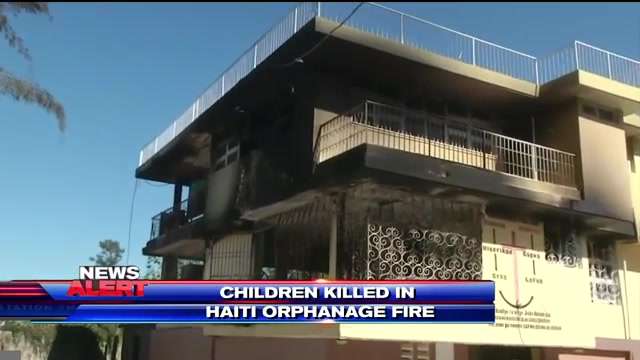Fatal Fire in Haiti Renews Questions About Orphanages

“Religion that God our Father accepts as pure and faultless is this: to look after orphans and widows in their distress,” wrote James in his New Testament epistle.
Haiti’s decades of poverty and poor governance have yielded more than its share of orphans, and for decades, Americans have tried to look after them.
An estimated $100 million in financial giving flows through orphanages, a vast and largely unregulated network of “orphanage-like institutions” ranging in quality from “adequate to abominable.”
Some of these facilities are deadly. Fire killed 17 orphans Feb. 13 at an unlicensed Port-au-Prince facility funded by a controversial U.S. church.
As The New York Times reported: “The orphanage is one of 754 operating in the country…though only 35 are accredited by the government.”
The fatal fire was caused by a burning candle, a common risk in a country with an undependable electrical system.
The facility is one of two orphanages operated by the Church of Bible Understanding, a separatist group based in Pennsylvania that’s been accused of cultic tendencies.
“Please pray for us in our time of immense grief,” the church said on its website. “We have suffered a tragic loss of children due to a horrific fire in Fermathe on the evening of February 13th, 2020. We ask for your continued prayers and support.”
The church has worked in Haiti since 1977, but lost its license to operate orphanages there years ago due to unsanitary conditions (including an alleged rat infestation) and inadequate staff training.
Two Scranton, Pennsylvania area TV stations sent a reporter to Haiti to investigate. He met with skepticism when he informed Haitians that the church claims it invests significant funds in its two orphanages.
“There is no way they’re pouring half a million dollars a year into the expenses of these homes,” said one local missionary.
A Broken System in a Broken Country
Only 20 percent of the estimated 25,000–50,000 children in Haitian orphanages are actually children with no living parents, according to the international news channel France 24.
Traditionally, parents who can’t provide for their children leave them at facilities set up to care for them. Studies show such facilities harm children’s development.
In 2010, Haiti suffered a devastating earthquake which killed a quarter of a million people, leaving a larger population of actual orphans.
Many orphanages provide needy children with the basics of survival, but others subject them to hunger, illness, abuse, pedophilia, child trafficking, and even organ trafficking.
“They are forced into labor,” said one Haitian official quoted in a 2018 CNN report,
“How traffickers exploit children in Haiti’s orphanages.” “And they’re allowed to live in squalor so that foreigners will give money out of pity.”
Some orphanages ask illiterate parents to sign legal documents that effectively give away children, some of which are later adopted by Americans, a practice that is less frequent today.
Some unregulated orphanages once tried to secure licenses, butgave up after the process ground to a halt or they were pressured for bribes. Many orphanages never even tried. The government has already shut down many facilities, and says it has targeted hundreds more for closure.
Few charities are up-front with donors about the legal status of their Haitian operations, requiring concerned donors to find out for themselves.
Through an Orphan’s Eyes
Many nonprofits use photos and stories of Haitian orphans to raise funds from generous Americans. A 2004 orphan photo deeply moved Harry Potter author JK Rowling, who decided to do something about it. She co-founded the nongovernmental organization Children’s High Level Group, now known as Lumos.
“Ultimately, we are working to end the use of orphanages and institutions for children entirely – not only in Haiti by 2030, but globally by 2050,” said a Lumos spokesperson.
https://www.independent.co.uk/voices/comment/thousands-of-children-are-living-in-orphanages-in-haiti-but-not-because-they-are-orphans-10345063.html
Rowling and Lumos are part of a growing movement in Haiti to replace the traditional orphanage system with better alternatives.Lumos seeks to keep families together.
Other groups are promoting foster care, which is not commonly practiced in Haiti.
Bethany Christian Services, a leading U.S. adoption agency, is also promoting foster parenting. It is recruiting and training Haitians to be foster parents.
Many children in Haiti need help. UNICEF estimates that roughly 400,000 of them live away from home to work households where they receive room and board in exchange for their labors. But donors need to be wise about how they help them.



